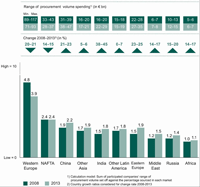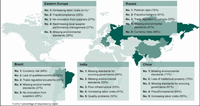Changing Tides In Global Purchasing: Focus On Cost-Efficiency

In the face of global financial turmoil, more and more companies are focusing on sustainable purchasing decisions. The study entitled "Best-value Country Sourcing – A Paradigm Shift for Global Sourcing Approaches" shows that strategies based solely on cost considerations are becoming less prominent. In their place, a "Best-value Country Sourcing" approach is gaining ground. This approach involves making global procurement decisions based on a range of different criteria.
In a joint action with the worldwide Procurement Leaders Network, BrainNet EAC surveyed 155 procurement managers and managing directors of international companies regarding their sourcing strategies. The survey provides a comprehensive view both of the status quo and of current trends in global sourcing. It also includes topical analyses and information on trends from the Supply Chain Management Institute (SMI) of the European Business School (EBS).
A summary of the key results of the study:
- Quantitative factors such as the cost of labor and raw materials continue to be the principal criteria for making decisions. 56 / 49 percent of those surveyed said these factors play a key role in decision-making processes.
- However, qualitative factors such as flexibility in production and logistics, access to a highly qualified workforce and the sourcing of innovation are gaining greatly in importance.
- Ethical and environmental considerations do not play a critical role yet, but are becoming significantly more important: this was confirmed in both cases by a quarter of those surveyed. Further proof of this is provided by the fact that a lack of environmental standards in China is viewed as the biggest impediment to procurement there.
"These figures show that a paradigm shift in global procurement strategies is on the horizon," commented Daniela Bartscher-Herold, Managing Director of BrainNet EAC. "Highly integrated value-creation chains and rapidly changing risk profiles call for discerning procurement decisions. The procurement branch these days is facing the challenge of creating sustainable value. And that goes far beyond simply calculating costs."
- Procurement volume continues to shift away from Western Europe and North America. In the next five years, the procurement volume in Western Europe will fall by at least 20 percent (approx. €24 billion), and in North America by at least 14 percent.
- India, China and Eastern Europe will in coming years continue to be among the winners of globalization. In India, the results of the survey point to an increase in procurement volume of between 38 and 45 percent. But "new" procurement regions like the Middle East are also gaining a reputation as attractive markets for procurement.

"The application of new decision-making criteria is causing procurement volumes to be distributed among more and more regions of the world," says Sven T. Marlinghaus, Partner and Managing Director of BrainNet Supply Management Group. "There is no longer one single procurement region par excellence. Depending on the company and the industry sector, certain pros and cons of a country can be critical for the decisionmaking process."
- The question of which is the primary procurement region can be answered differently from industry to industry. The manufacturing, oil and chemical industry, for example, primarily views India and the Middle East as key markets for future procurement. The financial sector, on the other hand, is focusing on Latin America and China.
- China and India are more enticing for large companies, while mid-sized companies are turning their attention more towards Russia, Eastern Europe and the Middle East.
- The new perspective on global sourcing is also having an impact on the "world map" of global procurement. The advent of local-for-local sourcing is a major component of this. The factors driving this relatively new development are on one hand rising logistics and transportation costs, and on the other, the increasing demand from developing nations and a looming tendency around the globe towards protectionism, aimed at boosting domestic real net output ratios. Of those surveyed, 34 percent said that the local-for-local approach will take on a more important role at their company in the next few years. This estimation is further supported by the fact that issues such as localization of products and services and having access to new markets are now decisive criteria in the choice of a procurement region.

"For several years now many international companies have been employing a strategy where they act as a local player in their target markets," says Marlinghaus. "Over the next few years we'll observe a distinct intensification of this trend."
Info box:
Six Crucial Requirements for a Successful Procurement Strategy
Those who were surveyed for this study – the procurement managers of several international companies – have identified six key tasks that must now be considered more closely:
- Optimization of procurement management to enable a high level of transparence and supervision;
- Development of functionally integrated procurement structures with expanded responsibilities and a strategic approach;
- A global configuration of procurement organizations in order to achieve maximum value and results. This will require the employees to reset their focus on relevant regions;
- Systematic preparation of employees for future challenges on the global procurement network through additional training;
- A sustainable procurement model that includes both international and local procurement solutions;
- Development and introduction of a best-value country sourcing approach.
Detailed results of the study "Best-value Country Sourcing – A Paradigm Shift for Global Sourcing Approaches" and photo material for printing can be requested at brainnet@maisberger.com.
About BrainNet EAC GmbH:
Leading CPOs are reaching the conclusion that global sourcing is about creating value in adaptive, global supply networks instead of just reducing costs. Therefore BrainNet has created its "Best Value Country Sourcing (BVCS)" approach. This approach combines best practices from more than 1.000 sourcing projects. Costs are only one of more than 20 key criteria's (e. g. value creation potential, quality, green procurement, risks, CSR,…) which are covered by our holistic
approach. This expertise can only be delivered based on a sustainable presence in the global key sourcing markets.
Therefore BrainNet and Euro Asia Consulting (EAC) have combined their expertise in global sourcing in the form of a joint venture. The result, BrainNet EAC GmbH, is the world's leading specialist in all matters relating to global procurement management. Even before establishing the joint venture, the two companies ranked amongst the most prominent consultants for Supply Chain Management consultancy, Asia strategies and implementation projects. The newly founded BrainNet EAC GmbH is the world's market leader with access to a unique infrastructure of branches in the world's main procurement markets.
About the BrainNet Supply Management Group AG:
BrainNet is the leading international brand for supply chain management consultancy. Employing 220 members of staff, BrainNet turns over €30 million globally. BrainNet develops and realizes tailored solutions for more than 80 of the companies listed in the Global Fortune-500 and around 240 fast-growing SMEs. For years, BrainNet has had offices in Bonn, Boston, Budapest, Chicago, Mumbai, Munich, Shanghai, St. Gallen, Tampa and Wroclaw.
Through its close collaboration with the Supply Chain Management Institute (SMI) at the European Business School (EBS), BrainNet offers a totally unique value-creation chain ranging from research and training young talent at leading business schools to implementing consultancy projects and strategic qualification of top managers and supply chain managers.
For more information about BrainNet, please go to www.brainnet.com.
SOURCE: BrainNet Supply Management AG
